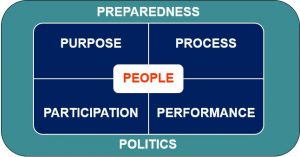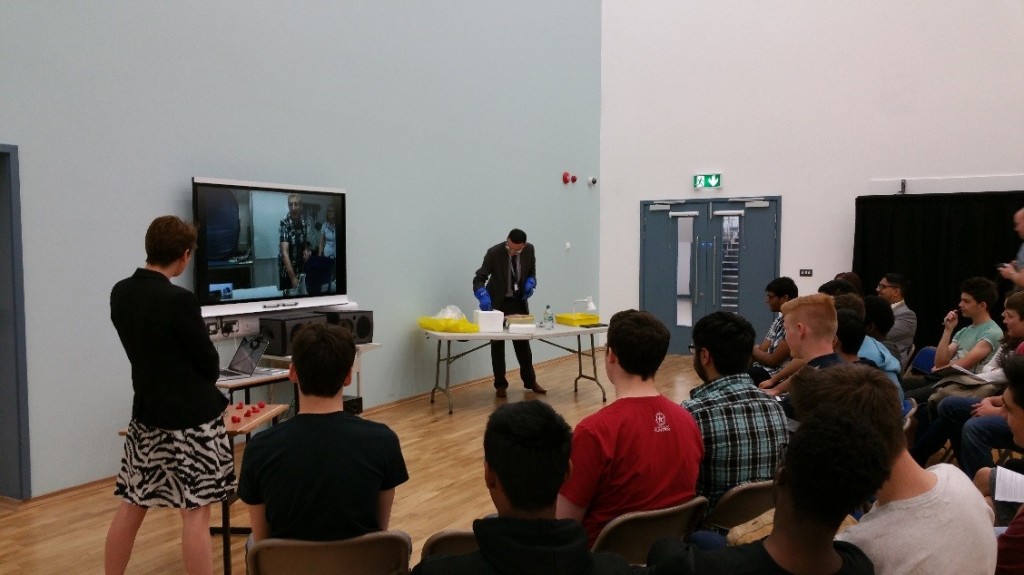
Professor Richard Holliman, The Open University.
How can you plan effectively for engaged research? What are some of the common pitfalls, and what counts as best practice?
Colleagues and I from the Open University and Denbigh School in Milton Keynes recently published a chapter in a new edited collection (Kucirkova and Quinlan, 2017) where we offer practical advice on how to respond to this important question in a pragmatic way (Holliman et al. 2017).
The framework has been designed to be applicable to any researcher and discipline, and to be adaptable to all forms of engaged research.
The chapter documents a worked example of the framework, involving an activity mediated via digital tools and technologies and involving scientists, an educational technologist, several teachers, 25 sixth-form students, and an evaluation researcher.
Framing engaged research

Planning for school-university engagement with research: preparedness, politics, people, purposes, processes and performance.
In the chapter, we introduce a framework developed to support researchers who are planning for engaged research. We have written this account primarily from a researcher perspective, but also with input from non-academic stakeholders. (For the purposes of this chapter, we take non-academic stakeholders to include end-users, members of the public, and any other non-academic beneficiaries.)
One of the aspirations for this framework is that it could also be adapted by a range of non-academic stakeholders to inform their negotiations with researchers.
Resources to support this way of working are available for free from the following location: Planning for engaged research.

The ‘Labcast’ activity in action, Denbigh School, Milton Keynes. Photo: Mark Russell.
Exploring research through collaboration
This work was developed through an Open University (OU) collaboration with Denbigh Teaching School Alliance in Milton Keynes. In producing the chapter we have drawn on our experience of working with teachers, advising Open University academics from across a wide range of disciplines, and consulting with Research Councils UK (RCUK) and the National Coordinating Centre for Public Engagement (NCCPE).
This work is also informed by other projects funded through the School-University Partnership Initiative (NCCPE, 2017).
Our thinking is also based on support we have offered to researchers through two related culture change projects: one designed to embed an engagement strategy and improve the quality of engaged research at the Open University, UK (Holliman et al., 2015); the other to develop a more structured, sustainable and aspirational culture for school-university engagement with research (Holliman and Davies, 2015).
The importance of upstream planning
We conclude the chapter by arguing that investment in upstream planning is crucial to the success of engaged research. It is therefore important to recognise that the strategic benefits of engaging stakeholders can far outweigh the time and effort invested.
Responding proactively and collaboratively to the principles of engaged research can improve researchers’ productivity and diversify their skills.
Done excellently, it will enhance a researcher’s career if they:
- 1) develop a track record of evidence-based critical reflection;
- 2) generate funding from external income; and
- 3) publish outputs, for example, in peer reviewed academic journals, but also evidenced through other forms of productive output.
This approach will help to develop your career profile through the confidence to collaborate with stakeholders as you work together to plan upstream, manage projects collectively downstream, and share the evidence of the social and economic impacts of your shared labours.
References
Holliman, R., Davies, G., Pearson, V., Collins, T., Sheridan, S., Brown, H., Hallam, J. and Russell, M. (2017). Planning for engaged research: a collaborative ‘Labcast’, in Kucirkova, N. and Quinlan, O. (eds.) The Digitally Agile Researcher. Open University Press, Maidenhead, pp 88-106, http://oro.open.ac.uk/50411.
Holliman, R. and Davies, G. (2015). Moving beyond the seductive siren of reach: planning for the social and economic impacts emerging from school-university engagement with research. JCOM 14(03), C06, pp. 1-10, http://oro.open.ac.uk/44415.
Holliman, R., Adams, A., Blackman, T., Collins, T., Davies, G., Dibb, S., Grand, A., Holti, R., McKerlie, F., Mahony, N. and Wissenburg, A. (2015). An Open Research University. The Open University: Milton Keynes, http://oro.open.ac.uk/44255.
Kucirkova, N. and Quinlan, O. (eds.) (2017). The Digitally Agile Researcher. Open University Press, Maidenhead, http://www.digitallyagile.com.
National Co-ordinating Centre for Public Engagement (NCCPE) (2017). School-University Partnerships: Lessons from the RCUK-funded School-University Partnership Initiative. Bristol: NCCPE, https://www.publicengagement.ac.uk/sites/default/files/publication/nccpe_supi_lessons.pdf.
Acknowledgements
Several of the ideas, workshop activities and tools discussed in this paper were funded through an award made as part of the RCUK School University Partnership Initiative (EP/K027786/1; http://www.rcuk.ac.uk/pe/PartnershipsInitiative) and a further award made through the RCUK Public Engagement with Research Catalysts (EP/J020087/1; http://www.rcuk.ac.uk/pe/embedding). The Labcast was funded through an RCUK ‘Bringing Cutting Edge Science into the Classroom’ Award (https://www.stem.org.uk/cpd-partners).
We acknowledge the many contributors to these projects, and to the Labcast activity in particular, notably: Andrew Squires (Denbigh School); Kate Bradshaw, Nicholas Braithwaite, Diane Ford, Ben Hawkridge and Chris Valentine (Open University); Claire Wood (NCCPE); and Jenni Chambers (RCUK). Jane Perrone provided helpful comments on a draft of this chapter. Finally, we acknowledge the contributions of the students who participated in the Labcast.
